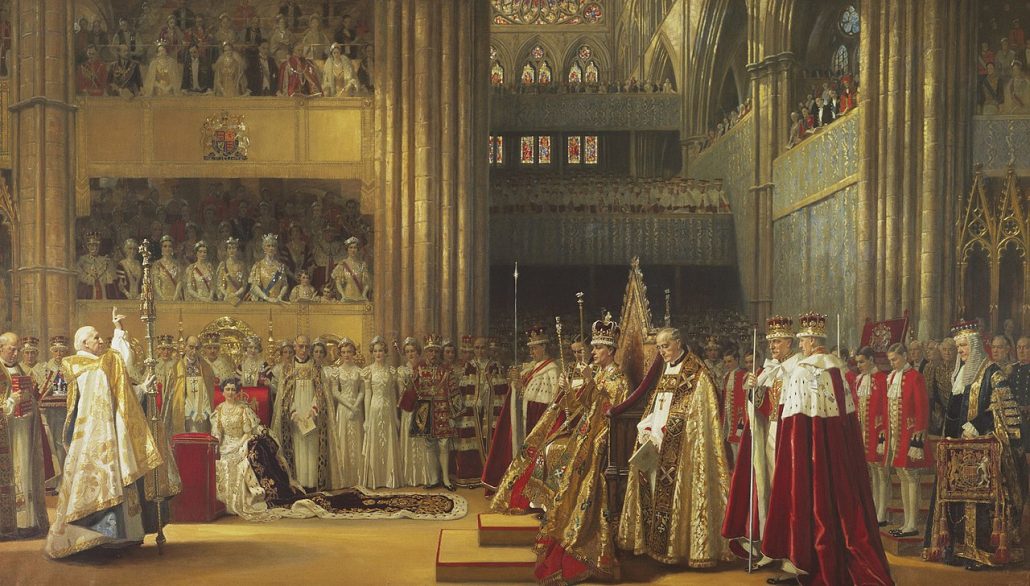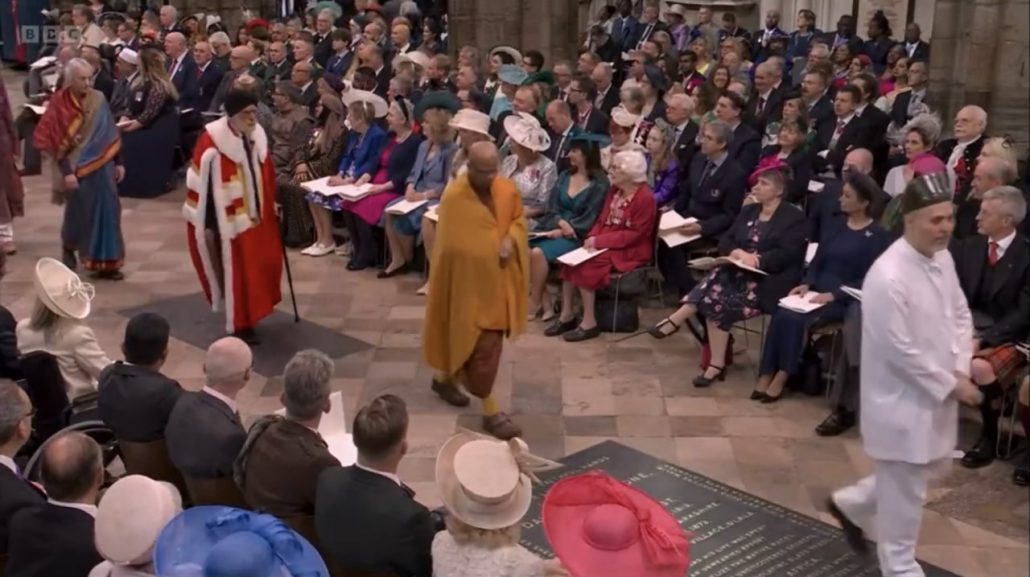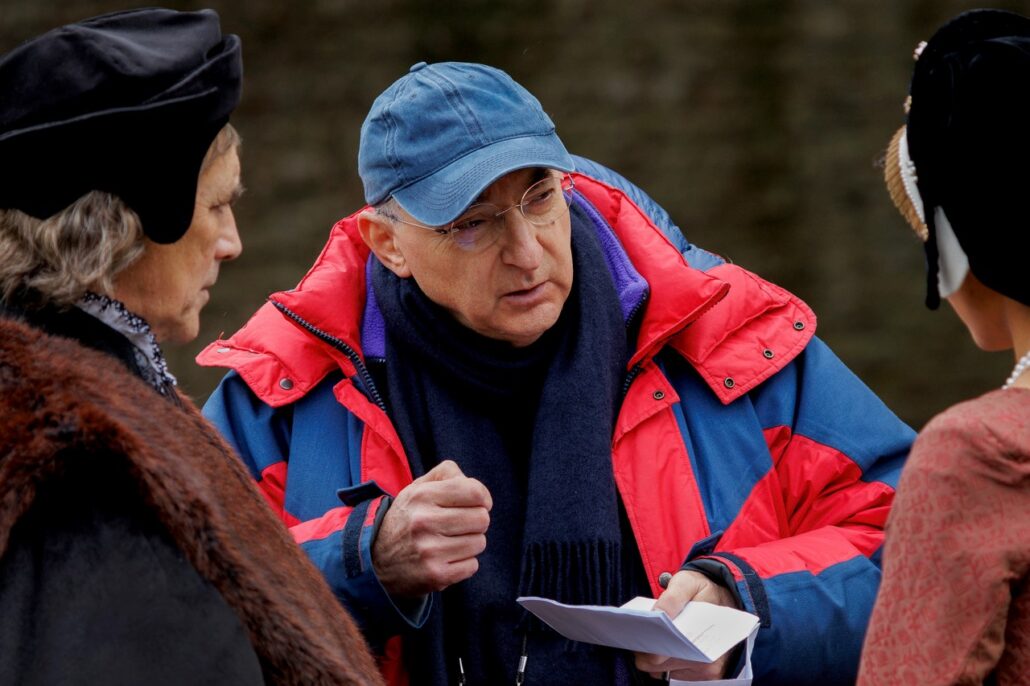
Part of the Royal Collection
It was 20 years ago, in May 2003, that Tony Blair’s spokesman Alastair Campbell famously said “We don’t do God”.
He later explained that this was not a major strategic statement but an attempt to end an interview with an American journalist, who kept asking “one final question” and asked Blair about his faith. “I suppose I ought to be flattered that my throwaway remarks somehow enter(ed) the national debate and are still being used years later” Campbell wrote. “It’s just a shame that the context gets mangled”.
After this weekend’s Coronation, it’s clear not only that King Charles III “does God” but that millions of people were profoundly affected by the two-hour ceremony in Westminster Abbey – the longest church service most will ever have attended. As well as the ancient liturgy and sublime music, they will have noted the prominence given to other faith leaders – from the moment they arrived to the service’s close, when the King stopped to talk with them.
It is instructive to read what Alastair Campbell wrote in 2010: “Inter-faith dialogue is in its own way going to be as important as political and diplomatic dialogue in the coming years and it cannot and should not be willed away. My ‘we don’t do God’ was simply part of a view that in UK politics, it is always quite dangerous to mix religion and politics, not least because the electorate are not keen on it, and the media and politicians tend to misrepresent it whenever it happens,”
So should broadcasters “do God”?
At the Sandford St Martin Trust, we believe it increases the understanding of faith: that is why the Trust was set up in 1978 by the benefactor and Anglican layman Sir David Wills. We continue to promote excellence in broadcasting about religion, ethics and spirituality – including all faiths and all outlets: the major networks, independents and online sources, at local and national level.
But how many of the broadcasters believe it?
At Westminster Media Forum’s recent conference on the draft Media Bill and the future of public service broadcasting, Colin Browne, chairman of Voice of the Listener and Viewer, expressed concern at the proposed relaxation of the public service programme remit. He said the draft Bill removes the responsibility for public service broadcasters to provide a range of programming which includes ‘science, religion and other beliefs, social issues, matters of international significance or interest and matters of specialist interest’.
The BBC’s director of policy Clare Sumner told the conference that, separately from the bill, Ofcom had published the new BBC operating licence which now operated across all its services – “and there are still 70 quotas, Colin”.
There was almost a “We don’t do God” moment when ITV’s director of strategy, policy and regulation Magnus Brooke said “Will we do a huge number of religious programmes? No, it’s not one of our strengths and we are a commercial organisation. I’m happy to pass this to Clare – that’s what the licence fee is for.”
He was unaware that an ITV programme, ‘Children of Ukraine’, is one of the finalists in this year’s Sandford St Martin Awards. ITV still managed to screen the full Coronation service – and over the past 45 years of the awards it has produced some of the best religious programmes. But seemingly it no longer “does God” and the fear is that other broadcasters will do less as the regulations are further relaxed.
When the draft bill was published, Dr Tony Stoller, the chair of Sandford St Martin Trust, said it replaced current requirements with “a much less specific obligation: ‘a sufficient quantity of audiovisual content that… reflects the lives and concerns of different communities and cultural interests and traditions within the United Kingdom’. We believe this qualification is too vague to be enforceable and fails to indicate what a ‘sufficient’ quantity is.
He went on: “We would also like to ask how, without targets, quotas or clear obligations around genres, the Government proposes the quality and quantity of PSB provision will be assessed? Who will do the assessing and what measures will they use to ensure audiences are getting the content they deserve?”
The Sandford St Martin Trust has long argued that to ignore religion is to leave a gaping hole at the heart of public service broadcasting. For this reason, we believe the Government must ensure that sustaining strong religious programming lies at the heart of modernising broadcasting legislation and the future of Public Service Broadcasting.
I’m now stepping down after 10 fulfilling years as a Sandford St Martin Trustee. I have fond memories:
– of helping build our engagement with broadcasters through events at the Edinburgh Television Festival and The Media Society, which our executive director Anna McNamee has extended with partners into an ongoing programme of conference sessions and salons;
– of memorable awards ceremonies at Lambeth Palace, attended not just by the shortlisted programme-makers but those who have received our Trustees Awards, from Melvyn Bragg, Joan Bakewell and Sir John Tavener to recent winners Stormzy and Sir Lenny Henry;
– and of the Trust’s persistence, with the support of the Archbishop of Canterbury, in helping persuade the BBC to draw up and publish its Religion and Ethics Review in which it vowed to “raise its game in religion”.
My work as a Sandford St Martin trustee has also enhanced my life as a parishioner in Chiswick in west London. Over the road from my parish church of St Michael & All Angels, Bedford Park, stands the London Buddhist Vihara, from where the orange-clad head monk, Most Venerable Bogoda Seelawimala, attended the Coronation. The Vihara was built at the same time as the church, though originally with a different purpose. As the social club of the world’s first garden suburb, it was attended by the young WB Yeats and many of his contemporaries.
Church and Vihara work together to sustain spirituality locally, bearing out Alastair Campbell’s belief that “Inter-faith dialogue is in its own way going to be as important as political and diplomatic dialogue in the coming years.”
A later Bedford Park resident was Richard Briers, who knew St Michael & All Angels well, regularly opening the church fete and helping raise funds in other ways. At his funeral, the vicar Fr Kevin Morris recalled that Richard used to say to him “You know Father, I’m not religious myself”. Looking round at the congregation, packed with knights, dames and other well-known faces, and then at Richard’s coffin covered in flowers and surrounded by candles, Fr Kevin said “Well you are now!”.
It brought the house down – and, as a sound-bite, it remains as memorable to me as Alastair Campbell’s.








Leave a Reply